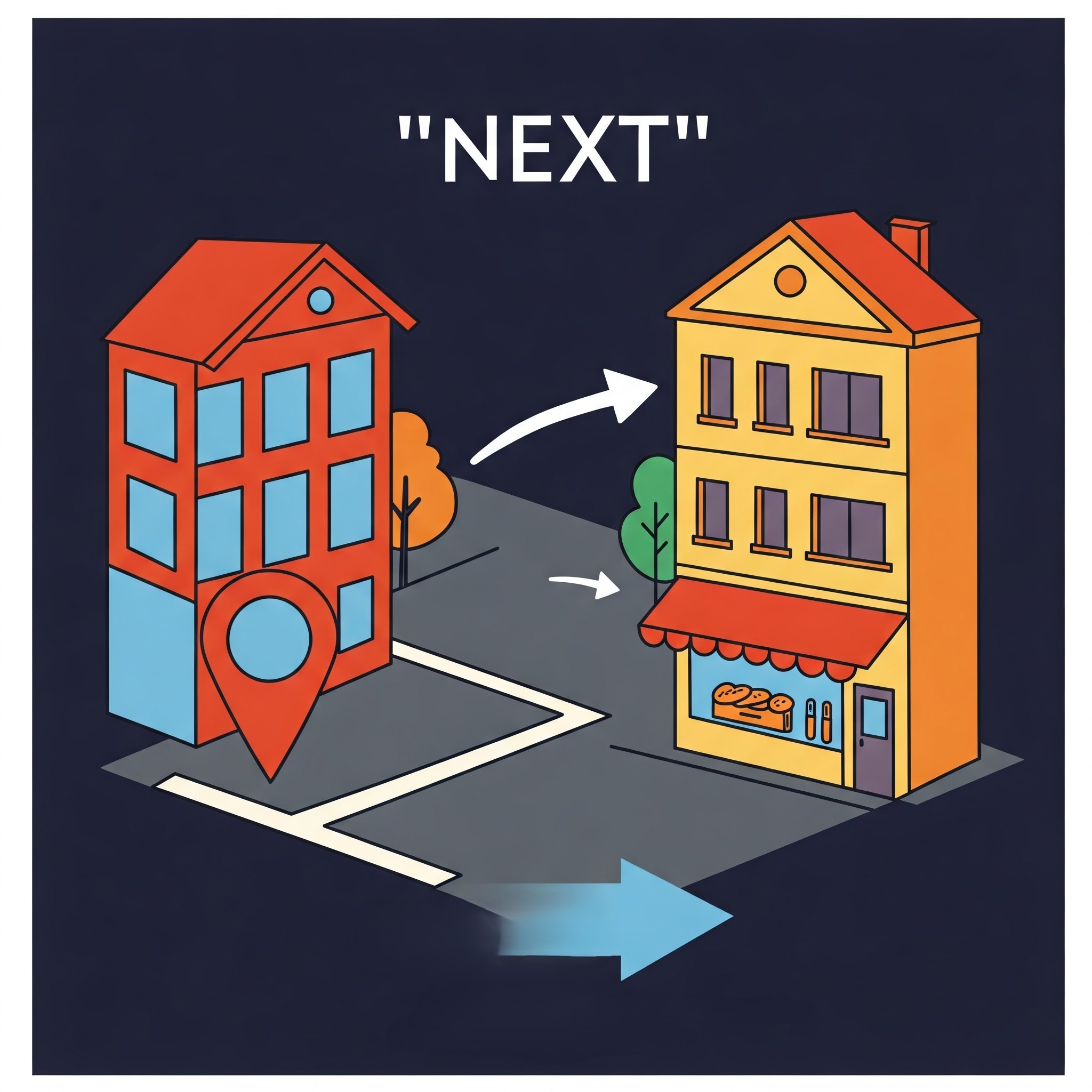Next
Definition
Next can function as an adjective, adverb, or noun. It refers to something immediately following in time, order, or position, or something coming after the present moment or situation.
Parts of Speech
- Adjective
- Adverb
- Noun
Pronunciation
American English
- IPA Pronunciation: /nɛkst/
- Respelling: NEXT
British English
- IPA Pronunciation: /nɛkst/
- Respelling: NEXT
Etymology
The word "next" originates from the Old English "nexte," meaning "nearest" or "closest in time or place," derived from Proto-Germanic "*nekista-" (nearest) and ultimately from the Proto-Indo-European root "*nek-" (to approach).
Derivatives
- Next-door (adjective)
- Next of kin (noun phrase)
- Next-to-last (adjective)
- Next-in-line (adjective)
- Nextness (noun, rare)
Synonyms
- Following
- Subsequent
- Upcoming
Antonyms
- Previous
- Past
- Last
Usage
The term "next" is widely used to refer to events, objects, or persons immediately following in sequence. For example: "The next bus arrives in 10 minutes," or "Who is next in line?"
Related Terms
- Following: Coming immediately after in time or order.
- Successive: Following one after the other in sequence.
- Adjacent: Next to or adjoining something else.
Detailed Definitions
Adjective
- Immediately following in time or order: Refers to something that comes directly after the current moment or position.
- Example: "The next chapter is about modern history."
- Closest or nearest in space or position: Refers to something adjacent or nearby.
- Example: "The bakery is in the next building."
Adverb
- At the time or place immediately following: Describes the action occurring immediately after the present one.
- Example: "What should we do next?"
Noun
- The person or thing that comes immediately after: Refers to the subsequent individual or event in a sequence.
- Example: "You are the next on the list."
next



🇨🇳 Chinese (Mandarin)
- 下一个 (the next one)
- IPA: /ɕi̯a˥˩ i˧˥/
- Respelling: Xià yīgè
- 接下来 (upcoming, next)
- IPA: /t͡ɕiɛ˧˥ ɕi̯a˥˩ lai̯˧˥/
- Respelling: Jiēxiàlái
🇮🇳 Hindi
- अगला (next, following)
- IPA: /əɡlaː/
- Respelling: Aglā
- बाद में (later, next)
- IPA: /baːd̪ meːɦ/
- Respelling: Bād mē
🇪🇸 Spanish
- Siguiente (following, next)
- IPA: /siˈɣjente/
- Respelling: Siguiente
- Próximo (next, upcoming)
- IPA: /ˈpɾok.simo/
- Respelling: Próximo
🇫🇷 French
- Suivant (following, next)
- IPA: /sɥi.vɑ̃/
- Respelling: Suivant
- Prochain (next, upcoming)
- IPA: /pʁɔ.ʃɛ̃/
- Respelling: Prochain
🇸🇦 Arabic (Modern Standard)
- التالي (next, following)
- IPA: /æltˤaːliː/
- Respelling: Altālī
- القادم (coming, next)
- IPA: /ælqaːdæm/
- Respelling: Alqādim
🇧🇩 Bengali
- পরবর্তী (next, following)
- IPA: /pɔrbɔrti/
- Respelling: Porborti
- আগামী (upcoming, next)
- IPA: /aɡami/
- Respelling: Agami
🇷🇺 Russian
- Следующий (next, following)
- IPA: /sʲlʲɪˈdujʂɨj/
- Respelling: Sleduyushiy
- Ближайший (nearest, next)
- IPA: /ˈblʲiʐɐjʂɨj/
- Respelling: Blizhayshiy
🇵🇹 Portuguese
- Próximo (next, close, near)
- IPA: /ˈpɾɔksimu/
- Respelling: Próximo
- Seguinte (following, next)
- IPA: /sɨˈɣĩtɨ/
- Respelling: Seguinte
🇮🇩 Indonesian
- Berikutnya (next, following)
- IPA: /bəriˈkutnja/
- Respelling: Berikutnya
- Selanjutnya (next, furthermore)
- IPA: /səlanˈd͡ʒutnja/
- Respelling: Selanjutnya
🇩🇪 German
- Nächster (next, following)
- IPA: /ˈnɛçstɐ/
- Respelling: Nächster
- Kommender (coming, next)
- IPA: /ˈkɔməndɐ/
- Respelling: Kommender
🇯🇵 Japanese
- 次の (next, following)
- IPA: /dʑiːno/
- Respelling: Tsugi no
- 次回 (next time, next)
- IPA: /dʑikai/
- Respelling: Jikai
🇻🇳 Vietnamese
- Tiếp theo (next in a sequence)
- IPA: /tjep˧˥ theːw˨˩/
- Respelling: Tiếp theo
- Kế (next in order)
- IPA: /ke˧˥/
- Respelling: Kế
🇰🇷 Korean
- 다음 (next)
- IPA: /ta̠ɯm/
- Respelling: Da-eum
- 차례 (next in turn)
- IPA: /t͡ɕʰa̠ɾje̞/
- Respelling: Cha-rye
🇹🇷 Turkish
- Sonraki (next)
- IPA: /sonɾaki/
- Respelling: Sonraki
- Gelecek (next, future)
- IPA: /ɟeleˈd͡ʒek/
- Respelling: Gelecek
🇵🇰 Urdu
- اگلا (next)
- IPA: /əglaː/
- Respelling: Agla
- بعد کا (next, after)
- IPA: /baːd kaː/
- Respelling: Ba'ad ka





